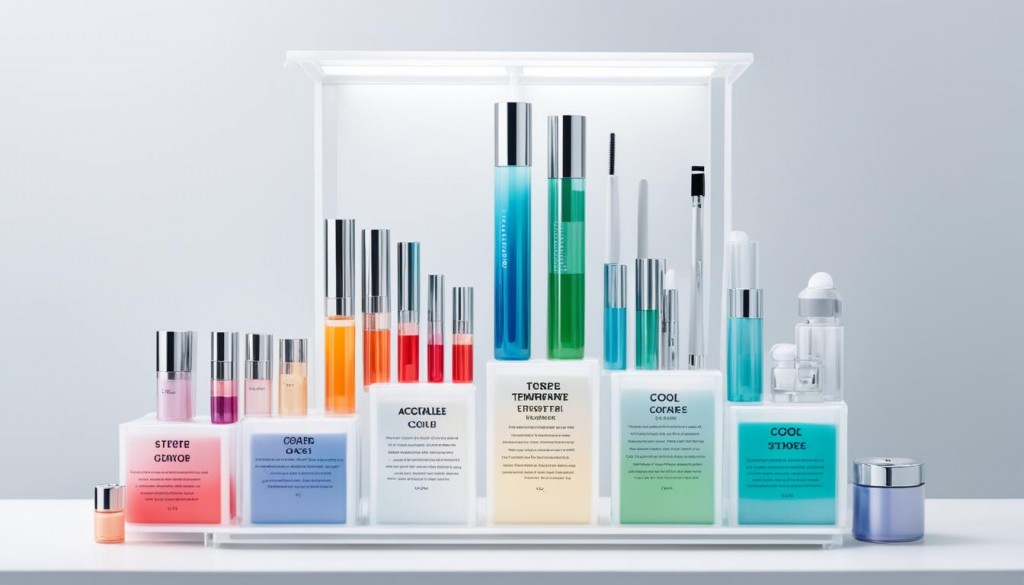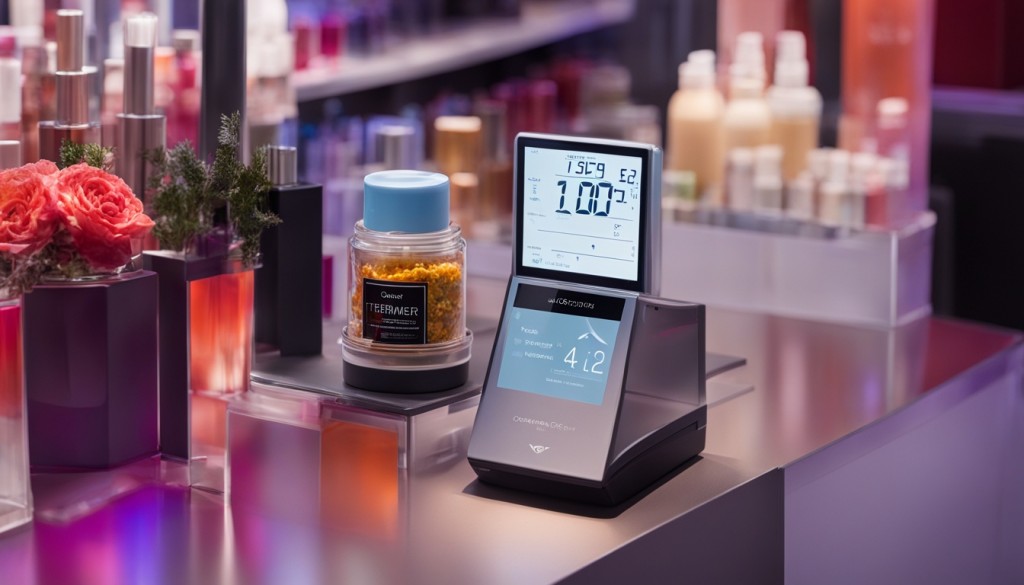July 28, 2025
The thermal control is crucial for the quality of cosmetics. Strict rules impose a Controlled temperature to maintain the integrity of the formulas. This optimal management meets the standards and ensures the customer satisfaction.A stable temperature guarantees high quality products. It prevents the degradation of active ingredients and preserves sensory properties. Controlled temperature optimizes the storage of cosmetics. It extends the shelf life products. This rigorous approach reduces losses and associated costs.
Temperature is vital to preserve cosmetics. It maintains their quality, efficiency and safety. Thermal variations may degrade formulations, prematurely altering the products.
Cosmetics are sensitive to temperature changes. Les thermal extremes alter their composition and compromise their effectiveness. Active ingredients, such as vitamins, are very vulnerable to thermal degradation.

Heat accelerates unwanted chemical reactions, reducing the effectiveness of products. It can also separate phases and modify the texture of cosmetics. Intense cold can crystallize ingredients and alter the consistency of formulas. It can also affect the homogeneity of the product.
Poor thermal management of cosmetics can have disastrous effects:
These problems can lead to significant financial losses for cosmetic companies. They can also damage their reputation and customer trust.
Faced with the problem of regulated technical training, which is often expensive and ineffective, Sinfony offers an innovative solution for training quickly and at a lower cost. all employees of a site with Good Practices, thanks to a combination of digital training and support in the field, for effective Blended Learning.
It is essential to maintain an optimal temperature throughout the supply chain. This requires specialized equipment such as air-conditioned warehouses and thermal monitoring systems.
The cosmetics industry obeys regulations strict for storing products. Les cosmetic standards international, such as Good Manufacturing Practices (BPF), impose specific requirements. They aim to guarantee quality and security products for consumers.The conformity To the rules of storing is crucial for cosmetic companies. Ignore these standards can have serious consequences. This includes product deterioration, expensive recalls, and reputational damage. Authorities conduct regular inspections. They check the adherence to Good Manufacturing Practices and the conditions of storing adequate.

Les cosmetic standards of storing encompass various essential aspects:
Consumer safety is our top priority. We are committed to the highest standards when it comes to the storage of cosmetic products.
Cosmetic companies need to establish detailed standard operating procedures (SOPs). These POS cover all aspects of Good Manufacturing Practices. They include protocols for storing specific for each type of product. Regular staff training is essential. It ensures the maintenance of the conformity and guarantees the security Of consumers.
The controlled temperature preserves the quality of cosmetic products. It guarantees efficiency and extends the shelf life. Businesses can thus satisfy their customers and optimize their storage costs.
La Controlled temperature maintains the effectiveness of the active ingredients. Some components are sensitive to thermal variations and may lose their properties. Precise control ensures that the products maintain their effectiveness. This ensures the consumer satisfaction. In this way, companies can offer products of consistent high quality.

A stable temperature slows the degradation of ingredients. It also prevents the proliferation of unwanted microorganisms. This allows companies to offer products with a longer lifespan. This reduces the risk of waste. Consumers benefit from better added value.
The controlled temperature reduces losses associated with product degradation. Inappropriate conditions may make cosmetics unsuitable for sale. This leads to financial losses and a waste of resources. An effective system minimizes these losses. Businesses can thus optimize their storage costs.Here is a comparative table illustrating the advantages of controlled temperature for cosmetic products:BenefitsWithout Controlled temperatureWith Controlled temperatureProduct qualityDegradation of active ingredients Preservation of the effectiveness of the ingredientsMaintaining the effectiveness of the ingredientsPreservation lifeShort shelf lifeShort, risks of wasteShort, risks of wasteProlonged, fewer lossesProlonged risks, fewer lossesHigh financial lossesOptimized, lossesThe controlled temperature offers numerous advantages for product storage cosmetics. It maintains quality, extends shelf life, and reduces losses. Cosmetic companies must adopt solutions adapted to their specific needs.
Technological advances are transforming temperature control in cosmetic storage. Les cooling systems modern and the smart sensors ensure precise management. Automation allows for constant monitoring and optimal responsiveness to variations.Temperature control technology brings numerous advantages to cosmetic companies:
Innovative systems, such as high-performance refrigeration units, ensure a stable temperature in the warehouse. Strategically placed sensors allow real-time monitoring of storage conditions.
Automating temperature management provides peace of mind for logistics managers, allowing them to focus on other key aspects of their business.
La remote management, thanks to connected technologies, allows temperature parameters to be adjusted at any time. This flexibility reinforces responsiveness to the unexpected and optimizes maintenance. TechnologyBenefitsCooling systems AdvancedMaintaining a stable and homogeneous temperatureSmart sensorsReal-time monitoring of storage conditionsAutomation ProcessesEffective management and optimal responsivenessRemote managementControl and adjustment of parameters at any timeInvesting in advanced technology ensures the quality of cosmetic products. This improves efficiency and strengthens the customer satisfaction. Optimal temperature management is crucial in this demanding sector.
A controlled temperature system is crucial for maintaining the quality of cosmetic products. It requires an assessment of needs, the choice of appropriate equipment and the training of personnel. These steps ensure efficient storage and distribution.
Each cosmetic product has unique temperature requirements. An accurate assessment is essential to determine the optimal conservation conditions. This analysis takes into account several important factors.
Once the needs have been identified, it is necessary to select adapted equipment. These should maintain a constant temperature. Several solutions are commonly used in the cosmetics industry.
The choice should take into account the reliability and accuracy of the equipment. Their ability to maintain a stable temperature is also crucial.
La staff training is essential in this system. Employees need to understand the importance of a constant temperature. They must also master the operating procedures standardized. This training covers several important aspects. It includes the correct handling and storage of products. Temperature monitoring and the management of differences are also discussed.
Faced with the problem of regulated technical training, which is often expensive and ineffective, Sinfony offers an innovative solution that allows train all site employees in Good Practices quickly and cheaply, thanks to a combination of digital training and support in the field, for effective Blended Learning.
Investing in staff training is crucial. It allows cosmetic companies to maintain an optimal storage environment. Thus, they guarantee the quality and integrity of their products.
Temperature monitoring is crucial to maintain the quality of cosmetics during logistics. Businesses need to implement robust registration systems to ensure the traceability And the regulatory compliance. These devices ensure accurate monitoring of storage conditions throughout the process. Modern solutions offer increased accuracy and reliability for real-time monitoring. These automated systems collect and analyze data on an ongoing basis. They quickly alert managers in case of deviations from the predefined temperatures.
La traceability thermal is essential to prove the conformity to regulatory standards. Businesses must provide evidence of compliance with storage conditions. This applies from the manufacture to the final distribution of cosmetic products.
Full and transparent traceability builds consumer trust and maintains brand reputation.
To ensure effective traceability, it is recommended to:
Supply Chain StageTemperature MonitoringData RecordingManufacturing ProcessingSensors in production and storage areasAutomated records and daily reportsTransportData loggers in vehicles and containersTemperature reports for each shippingDistribution WarehousesDistribution WarehousesCentralized Monitoring SystemContinuous Recordings and alerts in case of deviationsPoints of saleThermometers and data loggersRegular measurements and data archivingRigorous temperature monitoring guarantees the quality of cosmetic products. It also ensures the conformity to the regulations in force. This approach builds consumer trust in brands that adopt it.
Les Temperature differences may occur during the storage of cosmetic products. One corrective action plan robust is essential to manage these situations. It minimizes the impact on product quality. A real-time monitoring system is crucial. It quickly detects any discrepancies. Of alerts instantaneous responses allow staff to react quickly. Thus, optimal storage conditions are restored. During a discrepancy, Investigations thorough are essential. They determine the cause of the incident. These Investigations must be documented thoroughly. They include temperature data and the duration of the gap. Potentially affected products and corrective actions are also noted. This information is crucial to assess the impact and prevent recurrences.
Faced with the problem of regulated technical training, which is often expensive and ineffective, Sinfony offers an innovative solution to quickly and cheaply train all employees of a site in Good Practices, thanks to a mix of digital training, and support in the field, for effective Blended Learning.
After resolution, preventive measures are necessary. They avoid any recurrence. These measures may include:
Type of varianceCorrective actionsPreventive MeasuresTemperature that is too highAdjust refrigeration settings, move products to a cooler areaRegularly check settings, ensure adequate airflowTemperature too lowAdjust refrigeration settings, isolate refrigeration settings, isolate cold-sensitive productsRegularly check settings, avoid sources of excessive coldCheck settings regularly, avoid sources of excessive coldTemperature fluctuationsIdentify and correct the cause of fluctuations, closely monitor the products Affect To ensure a stable power supply, optimize the isolation of storage areasA solid corrective action plan is crucial. It minimizes the risks for cosmetic products. This proactive approach maintains customer confidence in product quality.
Optimal temperature management in cosmetics storage is crucial for product quality. It preserves the integrity of the active ingredients and prevents premature degradation. Thus, consumers benefit from safe and effective cosmetics that meet their expectations. This control of the cold chain reinforces the consumer trust towards the brand. It allows businesses to stand out by offering superior quality products. Preserving the beneficial properties of cosmetics contributes to customer loyalty. A controlled temperature system is becoming a real competitive advantage for cosmetic companies. It demonstrates their commitment to product quality and safety. This proactive approach reinforces the credibility of the brand in a highly competitive sector.
Transport under controlled temperature is crucial for cosmetic products because it makes it possible to maintain optimal transport conditions, thus avoiding temperature variations that could alter the quality and effectiveness of the products.
The products concerned by refrigerated transport include perishable goods, temperature-sensitive cosmetic products, as well as food products such as foodstuffs and frozen products.
Ideal transport conditions for cosmetic products include maintaining a constant temperature, generally between 15°C and 25°C, in order to maintain their integrity and effectiveness.
International transport regulations impose strict standards for temperature-controlled transport, including the use of refrigerated vehicles and the need for a technical compliance certificate to prove that transport conditions are met.
To ensure compliance with the cold chain during international transport, it is essential to use suitable insulated containers, to monitor the temperature throughout the transport and to train personnel on refrigerated transport practices.
Common challenges when transporting temperature-controlled products include temperature variations, transport delays, and refrigeration equipment failures, which can compromise product quality.
The ATP, or Agreement on the Transport of Perishable Foodstuffs, is an international regulation that establishes standards for the refrigerated transport of perishable products, thus guaranteeing their safety and quality during transport.
For the transport of frozen products, it is crucial to maintain a temperature of at least -18°C in order to prevent deterioration and to guarantee food safety.
The technical compliance certificate is important because it certifies that the transport conditions meet the standards required for the transport of perishable goods, thus ensuring the safety and quality of the products during their transit.
Controlled temperature transport is a process that maintains specific temperature conditions to ensure the quality and safety of sensitive products, such as perishable goods and cosmetic products.
Respecting transport conditions is essential to preserve the integrity of cosmetic products, avoid temperature variations that could alter their properties and ensure safety for consumers.
The products concerned by refrigerated transport include temperature-sensitive cosmetics, but also foodstuffs, pharmaceutical products and any product that requires storage at specific temperatures.
International transport regulations require products to be transported under controlled temperature conditions, often in accordance with standards such as the Technical Compliance Certificate and ATP requirements.
Not respecting the cold chain can lead to product degradation, quality losses, and even risks to consumer health, especially with cosmetic products and perishable goods.
Frozen products should be stored at a temperature of -18°C or lower to ensure their quality and safety during refrigerated transport.
The technical compliance certificate is a document that certifies that transport conditions, including temperature, meet the standards required for sensitive products, thus guaranteeing their safety and integrity.
To ensure that transport conditions are respected, it is important to use isothermal transport equipment, to monitor the temperature in real time and to train personnel on good handling practices for products involved in temperature-controlled transport.
Des formations conçues par des experts métier, régulièrement mises à jour pour coller aux exigences terrain. Découvrez nos modules les plus suivis et les mieux notés par les professionnels.

Formation complète sur les Bonnes Pratiques de Fabrication (BPF) adaptée à votre profil professionnel dans l'industrie pharmaceutique et vétérinaire.

Maîtriser les techniques et les procédures essentielles.

Les procédures essentielles d'hygiène et de sécurité pour le personnel...